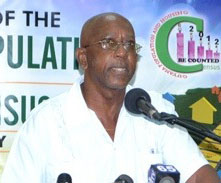Chief Statistician Lennox Benjamin yesterday said cross border immigration and the start of oil production will bring changes in the profiles of Guyana’s population over the next two to four years, thereby making the Bureau of Statistics’ data gathering essential to informing growth and development.
“Strange enough, one clear challenge that has emerged since 2012 is the changing face of our population. We are no longer a uniquely English-speaking country in South America,” Benjamin said, while speaking at the signing and launch for a joint Guyana Government and the United Nations Children Fund (UNICEF) US$1 million Multiple Indicator Cluster Survey (MICS 6) to monitor the situation of children and women. The US$1 million partnership is a 50/50 arrangement.
Language training and language proficiency have become a clear challenge, Benjamin said, while noting that by 2022 when the next population census is due, being bilingual at the minimum will be a clear requirement for the staff who would be managing and executing surveys.
“Government has already announced the establishment of homesteads in Region One for Venezuelans. Our basic assumption is that they will not be speaking English. They can very well fall into the sample of households in surveys. We have to be aware of the reality on the ground and we have to be prepared for it,” he explained.
Some 8,000 households across all regions of Guyana are targeted in the MICS 6 surveys. The recruitment process, for field staff, among others, Benjamin said, will begin in September and that exercise is due for completion by October.
The Bureau of Statistics’ intention, he further said, is to conduct and complete actual field work by February, 2019 to April, 2019, after which the data will be processed. A preliminary report, he added, should be completed by the end of next September.
Benjamin also announced that the surveying, which will target men as well, will be conducted with the use of tablets, with the shift from paper to paperless being an indication of the Bureau of Statistics’ objective to be fully digital by the next population census.
Noting that the current MICS survey is the fourth being conducted in the country, he said, the Bureau has benefitted from previous exercises through knowledge transfer and one of the biggest benefits was capacity building in survey design, survey execution and data analysis.
Compared to the rest of the Caribbean, he said, taking surveys in Guyana is very demanding, requiring the maximum of competence and ability.
The current MICS survey, he said, is coming at one of the busiest times in the history of the bureau when it is conducting quarterly labour force surveys, is due to start a national agricultural census and in a couple of months, it will begin the household budget survey and a living condition survey to demarcate a new poverty line.
The last household and living condition surveys, on which the performance of the growth of the economy is assured, were done in 2006.
“We need to know definitely before we start pumping oil, what we did before and what we did after,” he said, while noting also that consumption patterns will change.
The household budget survey, he said, will look at living conditions from which the poverty line is derived. The new surveys will look at the new level of consumption expenditure and a new demarcation of the poverty line. The last done in 2006 placed the poverty line at 36.1 per cent of the population living in moderate poverty.
Finance Minister Winston Jordan, who signed on behalf of government, urged the public to cooperate with the Bureau of Statistics and field operators in the conduct of the MICS exercises. The intended outcome, he said, will allow for better planning.
He recognised UNICEF’s “sterling contribution” by providing meaningful statistical data through the MICS primarily in social sector and welcomed its support.
The outcome of the MICS 6, which will cover 2018 to 2019, he said, will set the stage for further data collection.
UNICEF Representative Sylvie Fouet, who signed on UNICEF’s behalf, said UNICEF is committed to providing electronic tools for the surveys, and water testing among other things. The survey would also be building on assets that were put in place for MICS 5.





